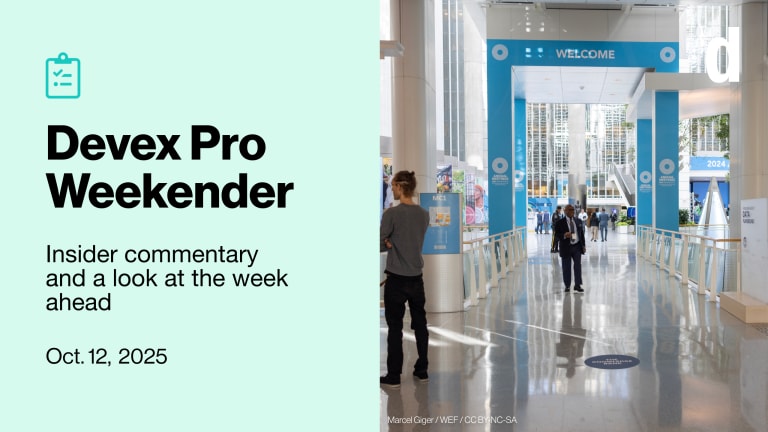
The World Bank secures its hard-fought capital increase, a new Sustainable Development Goals fund launches at the United Nations, and the United States shows up empty-handed at a Syria pledging conference. This week in development:
The World Bank secured an agreement from its shareholders to provide the institution with billions of dollars more in capital so that the bank can expand its role in financing development investments and addressing global challenges. Negotiations over the “general capital increase” — and what the bank’s 188 country shareholders would require it to do in order to hand over more money — dominated discussions at the World Bank and International Monetary Fund’s spring meetings last week. While many of the details are still to be worked out, World Bank President Jim Yong Kim announced a successful agreement on Saturday, during a meeting of the bank’s development committee. In exchange for $13 billion in capital — $7.5 billion of which will go to the International Bank for Reconstruction and Development and $5.5 billion to the International Finance Corp. — the bank’s board has directed the institution to look for ways to become more efficient, to attach its lending practices to a sustainable business model, and to adjust country shareholding percentages. As Devex reported, the Trump administration has expressed concerns that World Bank salaries are too high, and has argued for a reduction in employee annual raises.
Domestic resource mobilization and long-term investment were highlighted as two key areas of policy during the four-day long United Nations Forum on Financing for Development this week. Even as the global economy is strengthening, the annual funding gap for reaching all 17 Sustainable Development Goals by 2030 still totals about $2.5 trillion. "As a result, the development prospects for hundreds of millions of people remain in jeopardy. We need a comprehensive and systemic response to remain on track," U.N. Deputy Secretary-General Amina Mohammed said at the forum. She stressed greater domestic resource mobilization, and also the need to combat illicit financial flows, tax evasion, and money laundering. A new SDG Fund — designed to include both public and private partner financing — was announced Tuesday, with the goal of bringing in $290 million per year. It will work, in part, to provide "muscle" for U.N. resident coordinators. "We need less fragmentation and more predictability," Mohammed said.
Donors have pledged $4.4 billion in aid for Syria in 2018, far short of the United Nations’ estimated need — and more than $1 billion less than the amount pledged at a similar conference in Brussels last year. Glaringly absent from the pledging conference was any commitment from the United States, which has been one of the largest donors to Syria and its conflict-affected neighbors in recent years. Mark Lowcock, U.N. under-secretary-general for humanitarian affairs and emergency relief coordinator, explained that the U.S. is among a group of donors that “have not yet been in a position to confirm their financing for 2018,” due to ongoing budget discussions. Even if a U.S. pledge is still forthcoming, some U.S. development experts found the decision to pledge nothing at this conference worrying. “It is stunning for the U.S. — the largest humanitarian donor in the world — to show up empty handed to a conference of such importance. An utter abdication of leadership,” wrote Jeremy Konyndyk, the former U.S. foreign disaster chief, on Twitter.
President Donald Trump signed a bill that will allow the Millennium Challenge Corporation to make regional, instead of just single-country, compacts — a move the U.S. development agency has argued for years could allow it to take on more cross-border issues such as trade, energy, and water access. The African Growth and Opportunity Act and Millennium Challenge Modernization Act helps overcome a sticky logistical issue MCC had been facing. In places where MCC would likely look to pursue a regional compact, it tends already to have a compact underway with a country in that region, and had previously been prevented from signing a second one. This new law allows up to two simultaneous compacts with an MCC-eligible country. “The idea is that we’re going to take this model we’ve tested on a bilateral basis and apply it on a regional basis and really help to connect regional partners’ growing economies and markets, and really create some opportunities for trade and investment and help country partners become integrated on a regional basis,” MCC Acting CEO Jonathan Nash told Devex.
The U.S. Senate voted to confirm former Central Intelligence Agency Director Mike Pompeo as the new U.S. secretary of state on Thursday. Pompeo is seen as a more assertive foreign policy figure with a closer relationship to President Trump than his predecessor, Rex Tillerson. At the time of his nomination, a source close to Pompeo told Devex that he would likely bring “a fresh breath of strength and rigor” to the State Department, which has struggled to maintain morale and fill important staff positions during a controversial redesign effort, which Tillerson had been leading. Pompeo’s nomination has drawn sharp criticism from civil rights groups, which say he has made anti-Muslim statements and held positions that discriminate against LGBTI people. In a House appropriations subcommittee hearing, shortly before he was confirmed, U.S. Agency for International Development Administrator Mark Green said that he had a conversation with Pompeo several weeks ago about “general notions of development and the role of development alongside diplomacy” that were “very constructive” and said he believes the two agencies will work closely together.








